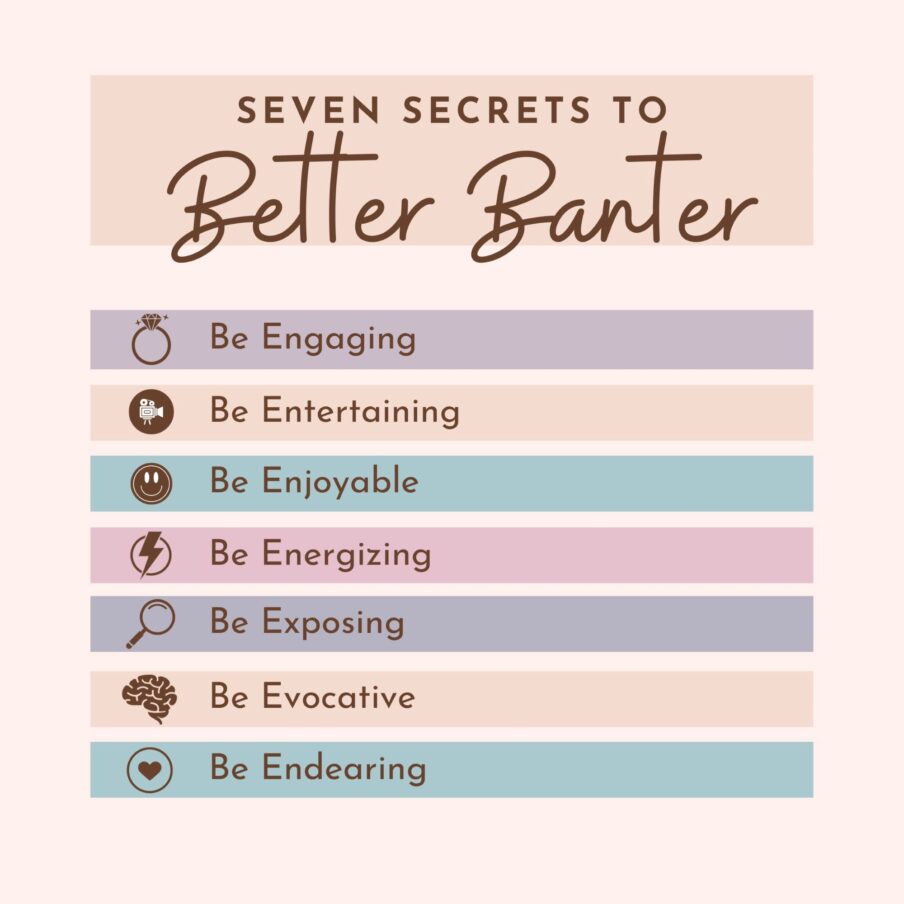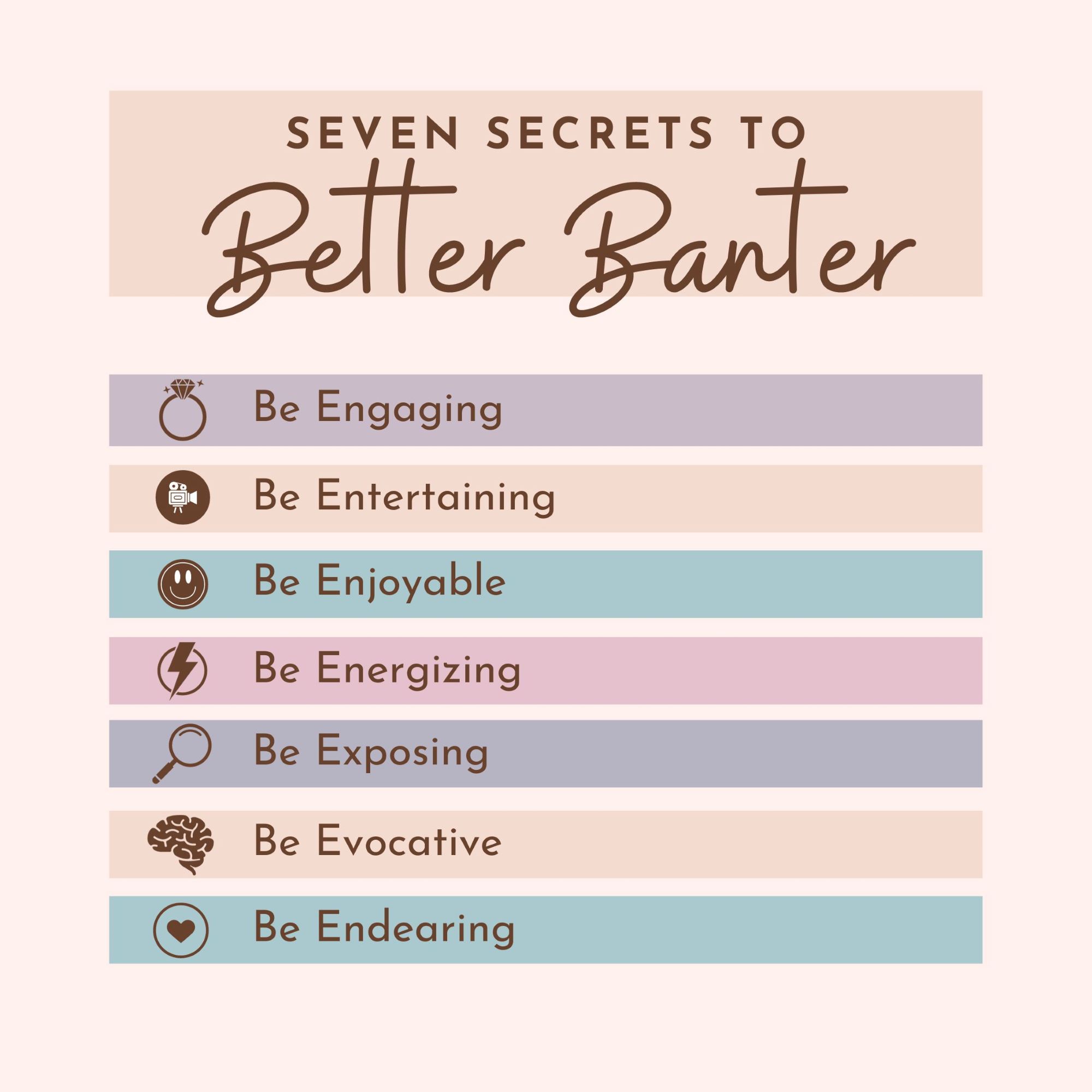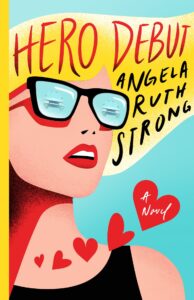by Angela Ruth Strong, @AngelaRStrong
I asked a group of romance writers for their thoughts on banter, and responses included:
“I heart banter.”
“Always banter.”
“I am pro banter.”
“Give me all the banter!”
“A book isn’t complete without banter.”
If banter is that great, I needed to break down the secret into basics so we can all banter better.
- Be engaging. Banter invites interaction.
Everyone has those people we’d rather avoid because conversation is painful. Banter is the opposite. It’s when those in the conversation keep thinking of more and more things to say because they share a connection and want to keep connecting.
I told author Betsy St. Amant I could’ve read a whole book of simply the texts between her characters in Tacos for Two. The novel is pretty much a lesson in engaging banter. Here’s how it starts.
We have to stop meeting like this.
You mean anonymously through a computer?
Exactly. I actually spent a long time trying to think
of something better to say than hi, but now I think
that would have been better.
I applaud your effort.
- Be entertaining. This connection isn’t facts-based or involves raw emotion. It’s light and witty.
Like an audience watching a comedy special, those who overhear such a conversation are going to tune in, as well.
For example, in Julia Monroe Begins Again by Rebekah Millet, Samuel’s daughter appears right as Julia is taking care of Samuel’s wounds.
“I was also bit by your dog repeatedly.”
“He’s a little poodle mix,” I explained to Brooke. “A speck. Not some monster animal your dad is making him out to be.” I turned to Samuel. “He didn’t even break your skin.”
“He’s the devil incarnate.”
“That is sort of true.”
“It’s exactly true.”
Note the line that follows: Brooke’s attention hung on our exchange.
- Be enjoyable. Banter makes fun of the heavy stuff so it doesn’t seem as heavy anymore.
It lifts the load of self-criticism and fear by making flaws/woes relatable. Participants aren’t only seen but accepted. Like the heroine of Melissa Ferguson’s Meet Me in the Margins who feels she’s a failure compared to the overachievers in her family.
“A real go-getter family you got there.”
“You have no idea.”
“Well, I can see why Pennington Publishing must be glad to have you, then.”
“Oh no.” I almost choke on my gin. “No. I’m nothing like the rest of them.”
Will’s eyes widen, and a smirk slowly rises on one side of his face. “Ah. So you aren’t a high achiever. Too bad.”
“Wait, no,” I amended quickly, setting my glass down to focus on correcting myself. “I don’t underwork. I do just … enough.”
“A very satisfactory level, you might say.”
I see it now, in his eyes. They’re mirthful. He’s teasing me. My lips start to curl. “Pleasantly sufficient.”
“Perfectly adequate,” he says, his eyes crinkling too. “You could highlight that on your CV.”
“How do you think I got this job?”

- Be energizing. Banter awakens the mind to catch double-meanings and play with puns.
It’s been years since I read Courting Trouble by Deeanne Gist, but it includes one of my favorite lines ever, and it was worth digging out from my bookshelf to share with you.
Essie is a spinster in the 1800s for reasons like how she’d rather catch snakes instead of pursuing feminine interests. She’s holding a snake in the general store when a cowboy enters and starts bantering.
“My name’s Adam. Adam Currington. And if your name’s Eve, I’m in a whole passel of trouble.”
- Be exposing. Because banter is playful, it makes sharing the painful stuff a little less painful.
As Plato once said, “You learn more about a person in an hour of play than in a year of conversation.” Banter offers both.
The example from #4 also exposes Adam in a sense of foreshadowing, but here’s some banter that leads to honest truths in Brynn and Sabastian Hate Each Other by Bethany Turner.
“It just hit me harder than expected.”
“How did you find out?”
“My mom…” He started laughing over the words. “My mom ran into Erin’s parents. Erin. My ex. My mother ran into her parents, and she tells me every insignificant detail before getting around to the fact that Erin’s pregnant.” His laughter dropped off, and his voice went quiet. “I didn’t even know she was married, and all of a sudden she’s not only married, she’s having a kid and her parents are shopping for truffle oil.”
“I don’t know what that means exactly, but I do know good truffle oil is hard to find.”
He chuckled and glanced at me. “Now you, my mother would like.”
- Be evocative. For all the above reasons, banter is memorable.
Snappy conversations become more than frosting on the cake. They’re gummy vitamins. They not only taste good, but they have lasting benefits.
I asked my editor about her thoughts on banter, and she mentioned how in my writing I have callbacks to bits like inside jokes that make readers feel smart for following the trail that got them there. Those bits can become catchphrases. They’re ideas that continue to inspire even after the story is over. For example, in my upcoming romcom, Fiancé Finale, Nicole questions her ex’s unconventional approach to life.
“Okay, weirdo.”
Charlie laughs. I must have startled it out of him because he’s usually too intense to laugh. “Did you just call me a weirdo?”
I’m smiling now too. It’s hilarious he doesn’t know how weird he is. “Yes.”
“What makes me weird?”
I shrug because it’s gotta be obvious to everyone else if his sister jokes about it. “It’s weird you don’t care what other people think.”
The catch phrase is repeated a couple of times until it crescendos chapters later with the following scene…
“You know I don’t care what they think.”
I lean forward, hands on his shoulders, sharing my mirth. “Okay, weirdo.”
His hands circle my waist, and all the air I’ve been fighting to breathe rushes straight out of my lungs. I straighten except for this little smirk in my lips that won’t go away.
His face tips toward mine, mouth hovering. “I’m going to kiss you next time you call me a weirdo.”
Fill in the blank.
- Be endearing. Last, this piece of advice comes from my agent. She pointed out that the teasing shouldn’t be mean-spirited or even accidentally hurtful.
Remember Anne of Green Gables where Anne breaks a slate over Gilbert Blythe’s head when he called her Carrots? That isn’t how you want your readers to feel about your characters’ teasing. You want them to experience the fondness that Anne and Gilbert eventually attain.
“I promise I’ll always be here if you need me. Good friends are always together in spirit. Let’s not change Gil, let’s just go on being good friends.”
“Friends, huh? I thought we were kindred spirits.”
And maybe there’s just that one secret to better banter. Make your characters kindred spirits in every imaginable way, then listen to all the fascinating things they have to say.
Gemma Bennett is the leading lady of her own life, and her true love is writing screenplays. With her trusty pink notebook in hand, she signs up for the Citizen’s Safety Academy to research her newest blockbuster hope, a rom-com with a police officer as the hero. And the fact that the handsome and heroic Lieutenant Karson Zellner is the one leading the training? Well, who can blame her for wanting to spend evenings with the man she swooned over months ago when he responded to a call at her apartment?
Karson already has his fair share of problems before Gemma shows up, and he’s not exactly a fan of the ditzy blonde who can’t seem to stay out of trouble. The last thing he needs is a damsel in distress to rescue; there are plenty of people in real need of his help. The fact that she seems to think his job makes him a superhero is just one more strike against her. This isn’t a movie, and he feels like the furthest thing from a leading man.
Gemma can’t seem to stop doing the worst, most embarrassing things at just the wrong time. And as time goes on, Gemma begins to realize that the scripts for a perfect screenplay and a real-life happily-ever-after are two very different things. Can she step out of her own way to find the hero her story needs?
Angela Ruth Strong survived breast cancer, works as a flight attendant, and uses her own crazy life experiences as inspiration for the stories she writes. Her books have earned TOP PICK in Romantic Times, been nominated for a Christy, won the Cascade Award, and become Amazon bestsellers. She and her husband also got to play extras when her novel Finding Love in Big Sky was adapted for film. To help aspiring authors, Angela started IDAhope Writers where she lives in Idaho. Visit her at www.angelaruthstrong.com.



